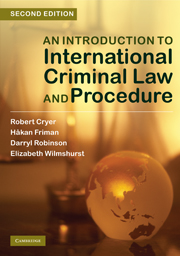Book contents
- Frontmatter
- Contents
- Preface to the Second Edition
- Table of Cases
- Table of Treaties and other International Instruments
- Table of Abbreviations
- PART A INTRODUCTION
- PART B PROSECUTIONS IN NATIONAL COURTS
- PART C INTERNATIONAL PROSECUTIONS
- PART D SUBSTANTIVE LAW OF INTERNATIONAL CRIMES
- PART E PRINCIPLES AND PROCEDURES OF INTERNATIONAL PROSECUTIONS
- PART F RELATIONSHIP BETWEEN NATIONAL AND INTERNATIONAL SYSTEMS
- 20 State Cooperation with the International Courts and Tribunals
- 21 Immunities
- 22 Alternatives and Complements to Criminal Prosecution
- 23 The Future of International Criminal Law
- Index
- References
21 - Immunities
from PART F - RELATIONSHIP BETWEEN NATIONAL AND INTERNATIONAL SYSTEMS
Published online by Cambridge University Press: 05 June 2012
- Frontmatter
- Contents
- Preface to the Second Edition
- Table of Cases
- Table of Treaties and other International Instruments
- Table of Abbreviations
- PART A INTRODUCTION
- PART B PROSECUTIONS IN NATIONAL COURTS
- PART C INTERNATIONAL PROSECUTIONS
- PART D SUBSTANTIVE LAW OF INTERNATIONAL CRIMES
- PART E PRINCIPLES AND PROCEDURES OF INTERNATIONAL PROSECUTIONS
- PART F RELATIONSHIP BETWEEN NATIONAL AND INTERNATIONAL SYSTEMS
- 20 State Cooperation with the International Courts and Tribunals
- 21 Immunities
- 22 Alternatives and Complements to Criminal Prosecution
- 23 The Future of International Criminal Law
- Index
- References
Summary
Introduction
Overview
The international law of immunities has ancient roots, extending back not hundreds, but thousands, of years. In order to maintain channels of communication and thereby prevent and resolve conflicts, societies needed to have confidence that their envoys could have safe passage, particularly in times when emotions and distrust were at their highest. Domestic and international law developed to provide for inviolability of a foreign State's representatives and immunities from the exercise of jurisdiction over those representatives.
While immunities are valuable in preventing interference with representatives, and thereby maintaining the conduct of international relations, they can also frustrate prosecutions for very serious crimes. In recent decades, with the advent of the human rights movement, States have taken stronger and stronger steps to prosecute international criminals. This emboldened State practice has brought to the fore many hidden or unresolved questions as to the boundaries between principles of accountability and immunity.
While international priorities are shifting in favour of justice and accountability, it would be an oversimplification to assume that international criminal law has simply superseded immunities law. Commentators have at times assumed that no immunity of any kind may be raised in response to allegations of genocide, crimes against humanity or war crimes. However, such a view overlooks different kinds of immunities, and is contradicted by the great bulk of State practice and jurisprudence.
- Type
- Chapter
- Information
- An Introduction to International Criminal Law and Procedure , pp. 531 - 560Publisher: Cambridge University PressPrint publication year: 2010
References
- 1
- Cited by



